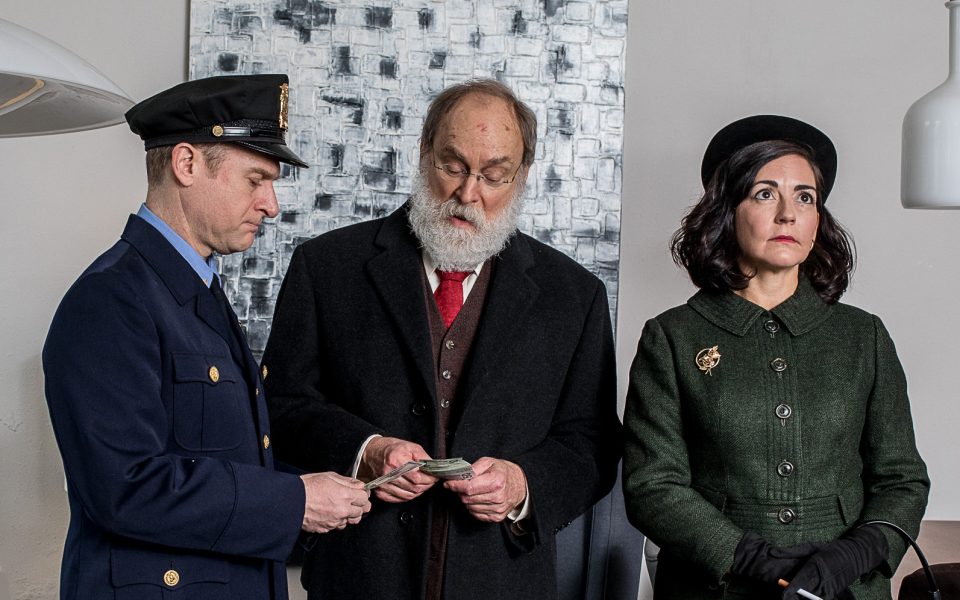Gregory Solomon, the 89 year-old antique dealer in Arthur Miller’s The Price, has a habit of voicing aloud his social observations. In the middle of the first act, he delivers an important one: People want things that break.
“What’s the key word today?” Solomon asks. “Disposable. The more you can throw it away the more it’s beautiful.”
Audience members at Greensboro’s Triad Stage might have nodded, thinking of new cars parked on Elm Street, new cell phones silenced in pockets or the disposable coffee cups warming their hands. But the acknowledgement itself is nothing new; despite the familiarity of the notion, The Price is about to turn 50.
Ironically, it’s the durability of this recognition that makes the play timeless, frightening, and at the same time a little dull.
The Price is set in the attic of a Manhattan brownstone, the childhood home of two estranged brothers. Victor Franz, a cop struggling with finances and weighing retirement, brings his wife to the home to meet Solomon, the dealer who will make an offer on the attic’s furniture. After they discuss the price for Franz’s late father’s items and begin to reach a deal, brother Walter Franz enters. The Franz brothers haven’t seen each other in 16 years.
The time apart has led to very different lives. Walter has publicly become a successful and wealthy man, the toils of which led to a breakdown and divorce three years earlier. But despite the suggested change in Walter’s persona, Victor envies his brother’s success and blames him for abandoning the care of their ailing father before he passed away. Their disparate observations, jealousies and perspectives — as well as the ones Solomon and Victor’s wife Esther introduce — form the play’s conflict and evoke the greater social and economic questions so familiar to those watching.
[pullquote]The Price runs at the Triad Stage through Feb. 19.[/pullquote]
It’s clear why Triad Stage chose The Price to begin its year: The political turmoil of the election has once again led to intense questioning of an enduring social system that the play exposes as fanged and ruthless — shades of 1968, the year of Arthur Miller’s composition and the peak of political unrest that resembles today’s fervor for social change. The play’s director and Triad Stage co-founder Preston Lane remarked in a press release that The Price “seems amazingly relevant in the uncertainty of our own troubled times.”
The themes the characters address are indeed familiar: success, money, social mobility, busted businesses, waste, friendly viciousness, monotony and the very durability mentioned here, recognized half a century ago.
Lane directs well, particularly as the play picks up in the second act with the introduction of Walter Franz. Lane’s actors triangulate fluidly and effortlessly when one character mounts the soapbox and the others recede, but the script itself is a little tiring with one convincing and passionate speech after another.
Since the characters battle out the same dilemmas that surround us today, perhaps it is the potency of our time that softens what may have once been a display of bold social dissension. Its timelessness fails it, files it away as another disclosure of social and economic hazard, but a challenge with too little closure or conclusion.
As Victor Franz and Solomon discuss the attic’s furniture, their words can be associated with the systemic struggles the characters and audience so often encounter.
When Solomon claims the durable furniture will worry a potential buyer, Franz replies, “Why’ll it make him nervous?”
Solomon responds, “Because he knows it’s never going to break.”
Perhaps it’s a suggestion that today’s audience hasn’t the strength to hear.
Join the First Amendment Society, a membership that goes directly to funding TCB‘s newsroom.
We believe that reporting can save the world.
The TCB First Amendment Society recognizes the vital role of a free, unfettered press with a bundling of local experiences designed to build community, and unique engagements with our newsroom that will help you understand, and shape, local journalism’s critical role in uplifting the people in our cities.
All revenue goes directly into the newsroom as reporters’ salaries and freelance commissions.


Leave a Reply